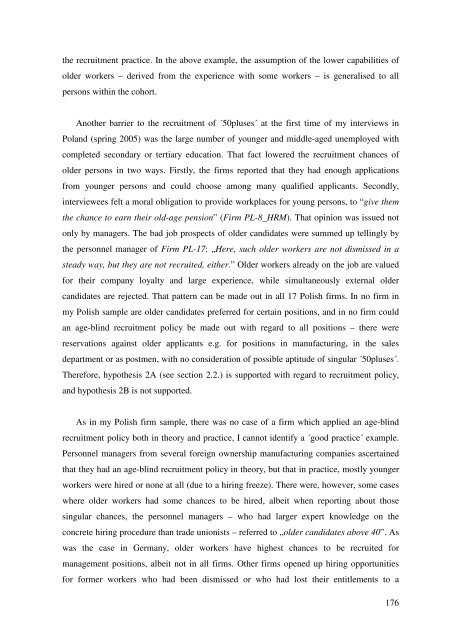Dissertation_Paula Aleksandrowicz_12 ... - Jacobs University
Dissertation_Paula Aleksandrowicz_12 ... - Jacobs University
Dissertation_Paula Aleksandrowicz_12 ... - Jacobs University
You also want an ePaper? Increase the reach of your titles
YUMPU automatically turns print PDFs into web optimized ePapers that Google loves.
the recruitment practice. In the above example, the assumption of the lower capabilities of<br />
older workers – derived from the experience with some workers – is generalised to all<br />
persons within the cohort.<br />
Another barrier to the recruitment of ´50pluses´ at the first time of my interviews in<br />
Poland (spring 2005) was the large number of younger and middle-aged unemployed with<br />
completed secondary or tertiary education. That fact lowered the recruitment chances of<br />
older persons in two ways. Firstly, the firms reported that they had enough applications<br />
from younger persons and could choose among many qualified applicants. Secondly,<br />
interviewees felt a moral obligation to provide workplaces for young persons, to “give them<br />
the chance to earn their old-age pension” (Firm PL-8_HRM). That opinion was issued not<br />
only by managers. The bad job prospects of older candidates were summed up tellingly by<br />
the personnel manager of Firm PL-17: „Here, such older workers are not dismissed in a<br />
steady way, but they are not recruited, either.” Older workers already on the job are valued<br />
for their company loyalty and large experience, while simultaneously external older<br />
candidates are rejected. That pattern can be made out in all 17 Polish firms. In no firm in<br />
my Polish sample are older candidates preferred for certain positions, and in no firm could<br />
an age-blind recruitment policy be made out with regard to all positions – there were<br />
reservations against older applicants e.g. for positions in manufacturing, in the sales<br />
department or as postmen, with no consideration of possible aptitude of singular ´50pluses´.<br />
Therefore, hypothesis 2A (see section 2.2.) is supported with regard to recruitment policy,<br />
and hypothesis 2B is not supported.<br />
As in my Polish firm sample, there was no case of a firm which applied an age-blind<br />
recruitment policy both in theory and practice, I cannot identify a ´good practice´ example.<br />
Personnel managers from several foreign ownership manufacturing companies ascertained<br />
that they had an age-blind recruitment policy in theory, but that in practice, mostly younger<br />
workers were hired or none at all (due to a hiring freeze). There were, however, some cases<br />
where older workers had some chances to be hired, albeit when reporting about those<br />
singular chances, the personnel managers – who had larger expert knowledge on the<br />
concrete hiring procedure than trade unionists – referred to „older candidates above 40”. As<br />
was the case in Germany, older workers have highest chances to be recruited for<br />
management positions, albeit not in all firms. Other firms opened up hiring opportunities<br />
for former workers who had been dismissed or who had lost their entitlements to a<br />
176
















